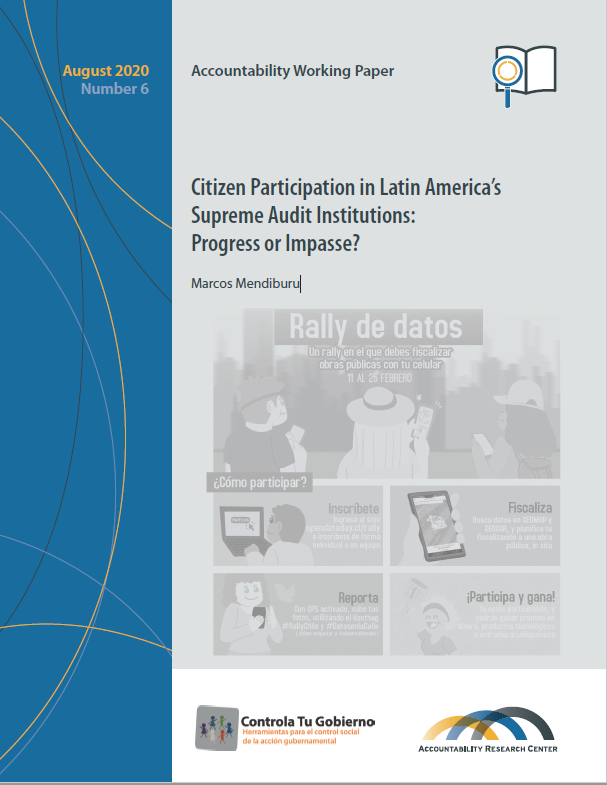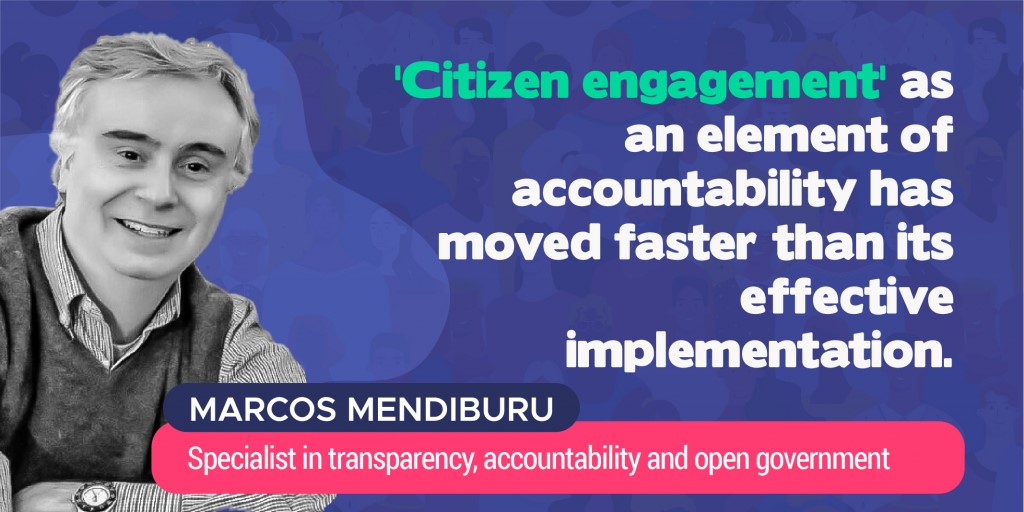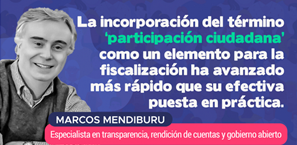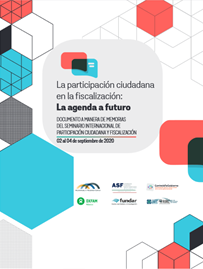
Citizen Participation in Latin America’s Supreme Audit Institutions: Progress or Impasse?
Date: August 2020
Author(s): Marcos Mendiburu
Publication type: Working Paper
Published by: Accountability Research Center and Controla Tu Gobierno
The notion of citizen participation in external audit processes dates back to the end of the 20th century. A few declarations of the General Assembly of the Organization of Latin American and Caribbean Supreme Audit Institutions (OLACEFS) and the work of its Citizen Participation Commission (CPC) have contributed to its conceptualization and recognition, encouraging the work of Supreme Audit Institutions (SAI) around this theme. This has been reflected in the institutional strategic plans and annual reports of a set of SAIs in the region. Therefore, the current debate now goes beyond whether citizen participation in the audit process is necessary and why. After more than two decades since the first reference to citizen participation in external auditing in a statement from the OLACEFS General Assembly, the question is how much and in which way SAIs’ promotion of citizen participation has made progress, and what are the results to date. That is to say, the question currently centers around the scope and depth of such citizen participation. Based on in-depth interviews and desk-review, as well as submitting requests for information, the analysis shows that the incorporation of the term “citizen participation” as an ingredient for audit process has advanced at a faster rate than its implementation. The implementation of citizen participation varies significantly among SAIs in the region in terms of its scope and depth. In many cases, it is still limited to a bounded exercise—generally a particular type of practice and/or to promoting participation during a specific phase of the audit cycle. Nonetheless, there is no evidence of the existence of a meaningful strategy—with specific objectives, instruments and results indicators—for citizen participation linked to broader organizational and learning processes within SAIs, nor a profound transformation in the exercise of audits. For this reason, after 20 years, it is worth considering whether progress is really being made, or there is an impasse in addressing citizen participation by SAIs in the region. In terms of the scope of citizen participation in oversight in the audit cycle, with exceptions, there is a significant deficit of practices and experiences of participation in SAIs during the phase of executing audits and following up on the findings and recommendations issued by SAIs. Regarding the depth of citizen participation in audits, there is an emphasis on the use of citizen complaints or channels for denunciations [although evaluations of its effectiveness are lacking] as well as dissemination of audit reports, followed by public awareness or training. However, according to the maturity model on citizen participation proposed by the Declaration of the OLACEFS General Assembly of Punta Cana in 2016, the practice of citizen complaints is associated with its most basic level of citizen participation. Furthermore, SAIs tend to promote consultative practices rather than collaborative practices, unlike other innovative spaces for participation, such as the Open Government Partnership. Finally, the number of SAIs that use new information and communication technologies for participation and collaboration with citizens is limited—beyond the use of online complaint systems and social media for communicating SAI work. For this reason, the question arises as to how far SAIs are adapting to the latest innovations and changes in citizen participation. This working paper provides an overview of citizen participation in external auditing in Latin America. After the introduction, Chapter 2 presents a synthesis of the evolution on citizen participation within the OLACEFS, as well as the progress observed in SAIs in the region. Chapter 3 proposes an analytical framework on citizen participation in auditing based on two dimensions: its scope and depth. Chapter 4 examines a set of SAI citizen participation practices in the region according to the four-level classification (basic / low / intermediate and advanced) proposed in the OLACEFS Declaration of Punta Cana. Chapter 5 analyzes a couple of practices and experiences of citizen participation in auditing due to its degree of institutionalization: participatory planning in the annual audit program of Argentina’s General Audit Office and the articulated audit at the General Comptroller Office of Colombia. Chapter 6 delves into the citizen participation policy of the General Comptroller Office of Colombia. Finally, the conclusion highlights some findings and recommendations for the future. As a result of the analysis undertaken, this study recommends that the OLACEFS’ Citizen Participation Commission promote an evaluation of the extent of citizen participation in each SAI according to its proposed levels of maturity, and that each SAI publicly reports on the effectiveness of the practices implemented (including the SAI’s responsiveness) as well as the impact of such citizen participation on external auditing. Brendan Halloran of the International Budget Partnership contributes a preface that frames citizen engagement with Supreme Audit Institutions in the broader context of accountability ecosystems. This study was commissioned by ControlaTuGobierno and ARC as a background study for the International Seminar on Citizen Participation and Oversight, held Sept. 2-4, 2020 with governmental and civil society participants from Argentina, Brazil, Chile, Colombia Mexico and Peru. https://fiscalizacion2020.mx/

“Data Rally in the Streets” is a campaign image prepared by the Comptroller General Office of the Republic of Chile, in collaboration with Fundación Observatorio del Gasto Fiscal de Chile.
Marcos Mendiburu is a consultant on issues of transparency, accountability, and open government. He has worked with numerous civil society organizations, foundations, governments, and international organizations. In 2018 and 2019, he coordinated the virtual course on strategies for citizen participation and Supreme Audit Institutions, co-sponsored by the Citizen Participation Commission (CPC) of the Organization of Latin American and Caribbean Supreme Audit Institutions (OLACEFS) and the Civil Association for Equality and Justice (ACIJ) from Argentina. Previously, Marcos worked for 16 years in the World Bank as Senior Governance Specialist.




